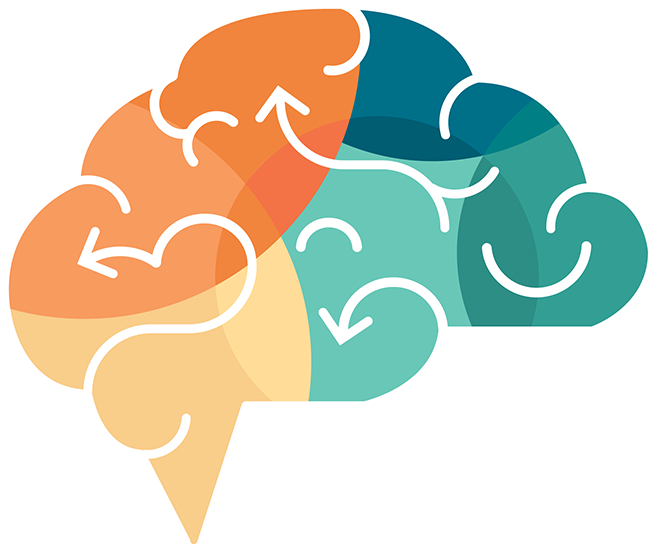Formally established in 2023, the research program at Pathways to Prevention works towards our goal of a future free from developmental trauma. We partner with academics, professionals and people with lived experience to perform research that has a practical impact on youth and family services.
Our research strategy includes four research pillars that are underpinned by two cross-cutting themes.
Research Pillar 1: Child maltreatment prevention and early intervention
Child maltreatment is one of the major sources of developmental trauma. Providing caregivers with skills and resources early in their child’s life can prevent abuse and neglect from occurring. Early intervention can also prevent traumatic events from leading to developmental trauma.
Research Pillar 2: Improving self-regulation with therapeutic recreation
Developmental trauma impedes the growth and regulation of sensory, cognitive and motor abilities. Therapeutic recreation is a way to increase the integration of body and mind. Recreation also promotes positive coping strategies and can help children build healthy relationships with adults.
Research Pillar 3: Increasing the success rate of transitions in care
Youth who experience developmental trauma often require costly services from the healthcare, child welfare and education systems. Providing the appropriate level of care reduces burden on families which reduces the risk of the youth experiencing trauma. Identifying ways to transition youth successfully from higher levels of care into lower levels of care optimizes use of scarce resources.
Research Pillar 4: Employee wellness and professional development
Providing effective care for youth who have experienced developmental trauma requires highly skilled clinicians and frontline staff. Child welfare professions tend to have high burnout, so expertise is difficult to sustain. Investing in improving organization health through employee competency and satisfaction is critical towards mitigating the impact of developmental trauma.
Cross-cutting Theme 1: Strengthening attachment and human relationships to promote wellness
Developmental trauma disrupts attachment and prevents the formation of secure relationships. Regardless of how we are supporting a family, we need to promote the development of healthy relationships built on trust and safety.
Cross-cutting Theme 2: Aligning services with Indigenous ways of being, knowing and doing
Indigenous youth are vastly over-represented in child welfare settings due to a combination of colonialism, intergenerational trauma and systematic racism. Our research processes will always be respectful and supportive of Indigenous cultures and knowledge systems.
Publications
-

Scientific Article
Lindenbach, D., Anderson, A., Wang, E., Heintz, M., Rowbotham, M., Ehrenreich-May, J., Arnold, P.D. & Dimitropoulos, G. Under Revision. Feasibility and acceptability of implementing a transdiagnostic cognitive behavioral therapy for children impacted by trauma within a residential treatment facility. -

Scientific Article
McQuay, J., Wilcox, G., & Nordstokke, D. (2023). The well-being of youth with complex needs in care preparing to transition to adulthood. Child & Youth Services, 1-18. -

Scientific Article
Dimitropoulos, G., Lindenbach, D., Rowbotham, M., Devoe, D.J., Richardson, A., Mogan, T., Patten, S.B., Ehrenreich-May, J. & Arnold, P.D. (2023). Feasibility and acceptability of a brief, online transdiagnostic psychotherapy for young adults. Journal of the Canadian Academy of Child & Adolescent Psychiatry. 32(2): 111-125. *... -
Scientific Article
Dimitropoulos, G., Lindenbach, D., Anderson, A., Rowbotham, M., Wang, E., Heintz, M., Ehrenreich-May, J. & Arnold, P.D. (2023). A qualitative study on the implementation of a transdiagnostic cognitive behavioral therapy for children in a child welfare residential treatment program. Child Abuse & Neglect, 146, 106487.... -

Scientific Article
Lindenbach, D., Cullen, O., Bhattarai, A., Perry, R., Diaz, R.L., Patten, S.B. & Dimitropoulos, G. (2021). Capacity, confidence and training of Canadian educators and school staff to recognize and respond to sexual abuse and internet exploitation of their students. Child Abuse & Neglect 112, 104898. -

Scientific Article
Hambrick, E. P., Brawner, T. W., Perry, B. D., Wang, E. Y., Griffin, G., DeMarco, T., … & Strother, M. (2018). Restraint and critical incident reduction following introduction of the Neurosequential Model of Therapeutics (NMT). Residential Treatment for Children & Youth, 35(1), 2-23. -

Scientific Article
Wilkes, T., Wang, E. & Perry, B. (2017). A neuro-developmentally sensitive and trauma informed service delivery approach for child and youth mental health and psychiatry. European Psychiatry, 41(S1), S309-S309. -

Book Chapter
Gruen, R., Lindenbach, D., Ehrenreich-May, J., Arnold, P., & Dimitropoulos, G. (2023). A trauma-informed approach to the Unified Protocol for Children with exposure to child maltreatment. In Shenk, C. (Ed.). Child Maltreatment Solutions. Springer Nature. * Open access publication -

Book Chapter
Leiberman, R.E., Champagne, T.C., Wang, E.Y. & Rushlo, K. (2020) Understanding and applying a Neurodevelopmental approach in Residential Interventions. In B. Caldwell, R.E. Lieberman, J.Lebel & G. M. Blau (Eds) Transforming Residential Interventions: Practical Strategies and Future Directions. -

Book Chapter
Wang, E. (2018) The neurosequential model approach: Integration and practice across multiple programs. In E. T. Perry, G. Griffin, M. Maikoetter, S. Graner, J. L. Rosenfelt & B.D. Perry (Eds) Proceedings of the 2nd International Neurosequential Model Symposium: Banff, Alberta Canada. The ChildTrauma Academy Press. -

Report
Push 2 Heal: Pilot Project Final evaluative report. (2022). * Open access -

Report
Wang, E. (2017). What does it mean to be trauma informed? Theory to Practice: Residential Care for Children and Youth, Special Edition #3. * Open access -

Research Support
“Preventing and mitigating developmental trauma through a transdisciplinary community-university partnership”. Lindenbach (Project Holder), Wang (Principal Applicant). University of Calgary Transdisciplinary Connector Grant. 2024. $17,000. -

Research Support
“A beginner’s pump track to support trauma-informed recreation for vulnerable youth.” Lindenbach (Primary Applicant), Pippus (Co-Applicant). Parks Foundation Calgary Amateur Sport Grant. 2024. $50,000. -

Research Support
“Capturing the youth voice to inform outcomes for child and youth advocacy centres.” Lindenbach (Co-applicant). Canadian Consortium on Child & Youth Trauma Seed Grant. 2023-2024. $25,000. -

Research Support
“LEAPS-IYS: Learning to Equitably Adapt Peer Support for Integrated Youth Services.” Lindenbach (Co-applicant). Canadian Institutes of Health Research Catalyst Grant. 2023-2024. $199,960. -

Research Support
“Enhancing resilience among vulnerable youth through online delivery of a brief, evidence-based psychotherapy.” Sipos (Primary Applicant), Wang (Primary Applicant), Lindenbach (Co-applicant). Government of Alberta Mental Health and Addiction COVID-19 Community Funding Application. 2020-2021. $48,000. -

Research Support
“Impact of child maltreatment: identifying biological and psycho-social predictors of risk, resilience and response to interventions.” Wang (Co-applicant). An Anonymous Donor. 2019-2022. $450,000. -

Research Support
“The Canadian Consortium on Child Trauma and Trauma-informed Care.” Wang (Co-applicant). Social Sciences and Humanities Research Council Partnership Grant. 2020-2027. $2,500,000.




